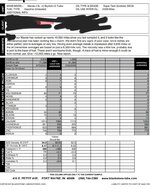Excessive Fuel oil dilution isn’t a known problem with this engine, but it is prone to some level of fuel oil dilution. Short commute in cold weather makes the fuel dilution worst. Because the engine doesn’t get warm enough to burn the portion of the fuel that can seap through the oil.
I know people don’t like this answer, but the real solution to prevent fuel dilution problem, is to conduct regular oil changes.
Unless your driving habit changes (if it remains used very little and on short commute) and that fuel oil dilution is a concern, i would recommend doing oil changes based on time interval (i.e. months since last oil change) as oppossed to mileage. The logic here being that changing the oil brings in new undiluted oil, and that driving little is actually worst for oil dilution than driving a lot.
I know people don’t like this answer, but the real solution to prevent fuel dilution problem, is to conduct regular oil changes.
Unless your driving habit changes (if it remains used very little and on short commute) and that fuel oil dilution is a concern, i would recommend doing oil changes based on time interval (i.e. months since last oil change) as oppossed to mileage. The logic here being that changing the oil brings in new undiluted oil, and that driving little is actually worst for oil dilution than driving a lot.

